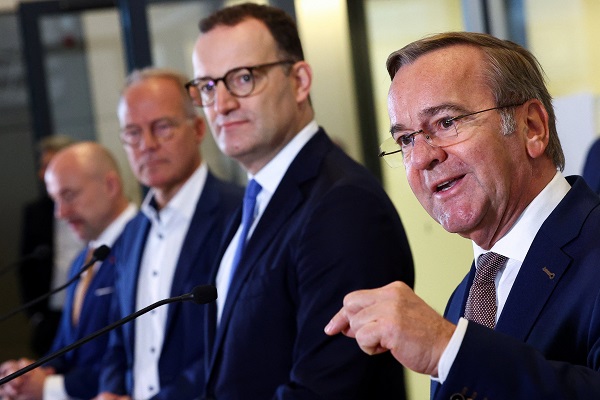 German Defence Minister Boris Pistorius addresses the media with CDU/CSU parliamentary group leader Jens Spahn and SPD parliamentary group leader Matthias Miersch at the lower house of parliament, the Bundestag, in Berlin, Germany, 13 November 2025;
Credit: Reuters/Lisi Niesner
German Defence Minister Boris Pistorius addresses the media with CDU/CSU parliamentary group leader Jens Spahn and SPD parliamentary group leader Matthias Miersch at the lower house of parliament, the Bundestag, in Berlin, Germany, 13 November 2025;
Credit: Reuters/Lisi Niesner
BERLIN (Reuters) - On Thursday 13 November 2025, Germany's coalition partners announced a compromise over new rules on military service, a key element in a wider drive to rebuild the country's shrunken armed forces.
The model agreed by Chancellor Friedrich Merz's conservatives and the centre-left Social Democrats would see a hybrid system built around voluntary service with the option of a mandatory call-up if needed.
Like other European countries, Germany, which had an army of almost half a million during the Cold War, ran down its armed forces during the peacetime years of the 1990s.
"We will make voluntary service more attractive, we want to get as many young people excited about service for their country," Jens Spahn, the parliamentary leader of Merz's Christian Democratic Union party told reporters. "If in the end, voluntary service isn't enough, there will have to be a mandatory element."
The agreement came after weeks of wrangling over what form of military service would be best suited to building up troop numbers while maintaining broad popular support.
Merz pledge to build Europe's strongest army
In the face of perceived threats from Russia and heavy pressure from Germany's traditional ally, the US, Merz has pledged to rebuild the Bundeswehr into Europe's strongest conventional army.
It currently has around 182,000 uniformed troops and has set a goal of increasing the size of the force to 255,000 to 270,000 with another 200,000 reservists.
The war in Ukraine and a stark warning from the administration of US President Donald Trump that Europe must take responsibility for its own defence has set off a scramble to rebuild and re-equip armed forces after years of neglect.
Defence Minister Boris Pistorius warned last year that Germany must be ready for war by 2029 and even before Merz's government took office in May, parliament agreed an unprecedented overhaul of rules to raise billions of euros for defence spending.
Under the new proposals, expected to come into law at the start of next year, a system of mandatory registration and medical screening will be introduced, while any compulsory call-up would be subject to a separate vote in Parliament.
All eighteen-year-olds will receive a questionnaire about their interest in serving. For men, answering the questionnaire will be mandatory. Recruits would receive monthly pay of €2,600.
Medical examinations will begin with those born in 2008 and expand gradually.
If the numbers volunteering for service are insufficient, parliament can vote for needs-based conscription, although the details of how this would function have not been agreed.








